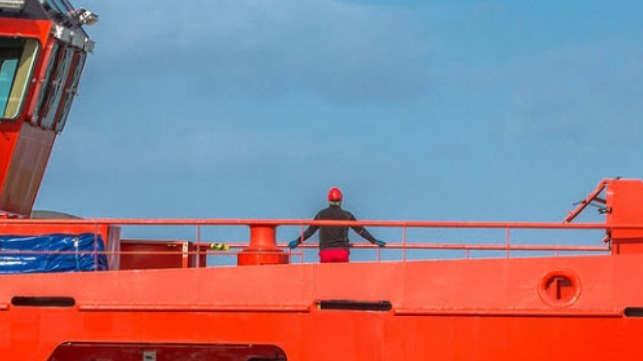 file photo courtesy of Alan Jamieson
file photo courtesy of Alan Jamieson
By The Maritime Executive 04-20-2020 10:51:18
The confidential incident reporting scheme CHIRP Maritime has released advisory papers on medical and psychological aspects relating to seafarers currently on vessels during the COVID-19 pandemic.
COVID-19 general advice to Masters and crew was prepared by Dr. Suzanne Stannard, Consultant, Norwegian Centre of Maritime and Diving Medicine and member of the CHIRP Maritime Advisory Board. It highlights a range of medical resources available online including an online, interactive tool to assist in the management of possible COVID-19 cases on board and was developed by the Centre. It is freely available to all and can be found at www.covid19atsea.no
Focus on seafarer wellbeing during Covid-19 pandemic was prepared by Dr. Claire Pekcan, Director of Safe Marine and member of the CHIRP Maritime Advisory Board. It highlights an array of resources available to seafarers, some designed to be proactive and prevent problems from occurring, others containing advice on how to deal with situations as they arise, and others that offer reactive measures that help people to deal with their own and others’ reactions to the circumstances that they find themselves in.
CHIRP Maritime has also prepared an insight article into the plight of seafarers at this time. The article suggests topics that shipping companies might consider in order to mitigate seafarers’ concerns. As an example of problems being experienced, the article notes that Filipino crew arriving back in Manila are unable to leave the city to reach home on another island due to the current restrictions on movement within the metropolitan area of Manila. Equally, some other countries have forbidden any persons to enter, including their own citizens. Therefore, seafarers are often unable to enter their own country, leaving them stranded at the port of disembarkation or en-route.
There are plenty of areas where companies might consider the well-being, health and safety of crews which are currently “trapped on board,” states the article. These include:
• Regular updates from the company with information about the current status of the pandemic particularly focused on information from the seafarers’ home countries,
• Access for seafarers to make regular contact with their families by telephone, social media, or perhaps company email if a specific crew mail system is not installed on board,
• Similar information and assistance from manning agencies should be the norm and not the exception
• Shore leave in many ports is currently banned or severely restricted. Thus, if the vessel does not have a slop chest, companies could instruct their masters to see which crew members need essential toiletries and perhaps medication, then instruct the vessels agents to order and supply,
• Where seafarers have an urgent financial requirement then this should be treated in a pragmatic, compassionate, and urgent manner by shipping companies,
• Perhaps a financial incentive such as an additional bonus and/or increased leave,
• A reduction in hours worked to allow for more relaxation, and
• A guarantee of future employment on completion of leave would give the seafarer some reassurance.
The papers are available here.
source: www.maritime-executive.com


